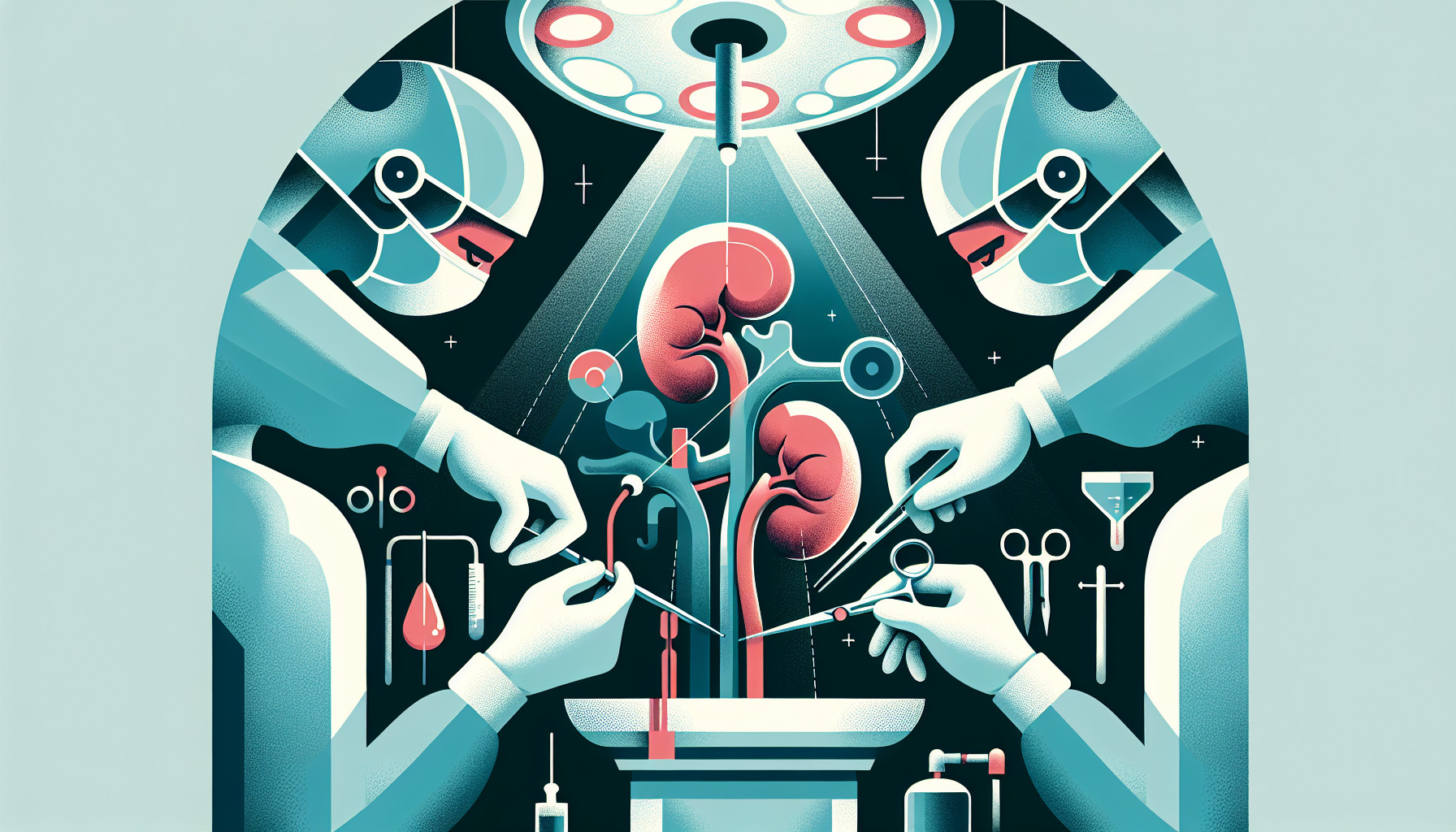Our Summary
The study aims to understand the effects of two surgical procedures - laparoscopic partial nephrectomy (LPN) and robot-assisted partial nephrectomy (RAPN) - on kidney function in patients with kidney cancer. The researchers looked at data from 174 patients who had one of these procedures and analyzed their kidney function before and 6 months after the surgery.
The results showed that around 40% of the patients were able to maintain over 90% of their kidney function, which was considered a successful outcome. Patients who had this successful outcome had lower scores on a kidney disease severity scale (RENAL nephrometry scoring system), and fewer of them had tumors on the outside of their kidneys.
Successful outcomes were also more likely when the surgery involved less time without blood supply to the kidney, was performed using a robot, and did not involve suturing of the kidney tissue.
The study concludes that the severity of kidney disease before surgery and whether or not suturing of the kidney tissue is used are significant factors in maintaining good kidney function in patients undergoing partial nephrectomy for kidney cancer.
FAQs
- What was the primary focus of the study on laparoscopic partial nephrectomy (LPN) and robot-assisted partial nephrectomy (RAPN)?
- What factors were found to contribute to successful outcomes in maintaining kidney function after surgery?
- How does the severity of kidney disease before surgery affect the outcome of the LPN and RAPN procedures?
Doctor’s Tip
A doctor might tell a patient undergoing laparoscopic nephrectomy to follow post-operative instructions carefully, including avoiding heavy lifting and strenuous activity for a certain period of time, as this can help promote healing and reduce the risk of complications. Additionally, staying hydrated and following a healthy diet can also support kidney function during the recovery process. It’s important to communicate any concerns or changes in symptoms to your healthcare provider to ensure a successful outcome.
Suitable For
Patients who are typically recommended for laparoscopic nephrectomy are those with kidney cancer who have a lower severity of kidney disease, tumors located on the inside of the kidney, and a lower risk of complications during surgery. Additionally, patients who are younger and have better overall health may also be good candidates for laparoscopic nephrectomy.
Timeline
Before laparoscopic nephrectomy:
- Patient is diagnosed with kidney cancer and discusses treatment options with their healthcare provider
- Patient undergoes pre-operative tests and evaluations to determine if they are a candidate for laparoscopic nephrectomy
- Patient is informed about the procedure, risks, and recovery process
During laparoscopic nephrectomy:
- Patient is placed under general anesthesia
- Surgeon makes small incisions in the abdomen and inserts a laparoscope (a thin tube with a camera) and surgical instruments
- Surgeon removes the affected kidney or part of the kidney using minimally invasive techniques
- Procedure typically lasts several hours
After laparoscopic nephrectomy:
- Patient wakes up in the recovery room and may experience pain, nausea, and fatigue
- Patient is monitored for complications such as bleeding, infection, or blood clots
- Patient is discharged from the hospital within a few days and instructed on post-operative care and follow-up appointments
- Patient may experience temporary changes in kidney function and may need to adjust their diet and lifestyle habits
- Patient gradually resumes normal activities and is monitored for long-term kidney function and cancer recurrence
Overall, laparoscopic nephrectomy is a minimally invasive procedure that can effectively treat kidney cancer with less pain, shorter recovery time, and fewer complications compared to traditional open surgery.
What to Ask Your Doctor
What are the benefits of laparoscopic nephrectomy compared to traditional open surgery for kidney cancer?
What are the risks and potential complications associated with laparoscopic nephrectomy?
How long is the recovery period after laparoscopic nephrectomy?
Will I need to make any lifestyle changes or follow a specific diet after the surgery?
How often will I need to follow up with you after the surgery?
What specific factors will determine whether or not I am a good candidate for laparoscopic nephrectomy?
How will my kidney function be monitored both before and after the surgery?
Are there any alternative treatment options for my kidney cancer that I should consider?
How experienced are you and your team in performing laparoscopic nephrectomies?
Can you explain the results of the study that looked at the effects of laparoscopic partial nephrectomy on kidney function in patients with kidney cancer?
Reference
Authors: Ohba K, Matsuo T, Mitsunari K, Nakamura Y, Nakanishi H, Mochizuki Y, Miyata Y. Journal: Anticancer Res. 2022 Jun;42(6):3055-3060. doi: 10.21873/anticanres.15792. PMID: 35641274
